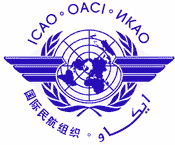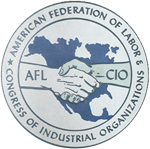Affiliations
The Air Line Pilots Association, Int’l (ALPA) is an airline pilot’s ticket to the global airline community. By using ALPA's resources to participate more directly and globally in issues germane to the union's representational responsibilities, only ALPA is able to reduce the negative effects of global whipsawing, particularly among global airline system pilot groups. The affiliations detailed below give the Association a foothold in the worldwide industrial and regulatory landscape of the piloting profession.
 The International Civil Aviation Organization (ICAO), an agency of the United Nations, sets safety standards and regulations for the global air transportation system. Fifty-two participating States (countries) signed the Convention on International Civil Aviation in November 1944, making the organization a permanent fixture. Today, ICAO serves as the conduit for civil aviation cooperation for nearly 200 member States, issuing standards and recommended practices (SARPs) to provide guidance for airline, airport, and air traffic management operations around the globe. ALPA plays a major role in that policy making process through the International Federation of Air Line Pilots' Associations (IFALPA), of which U.S. ALPA and ALPA Canada are important members. The Association will endeavor to stay ahead of the ICAO’s policy agenda and influence it to achieve the same level of safety and security it strives to achieve here in the United States and Canada through its various leadership positions within IFALPA.
The International Civil Aviation Organization (ICAO), an agency of the United Nations, sets safety standards and regulations for the global air transportation system. Fifty-two participating States (countries) signed the Convention on International Civil Aviation in November 1944, making the organization a permanent fixture. Today, ICAO serves as the conduit for civil aviation cooperation for nearly 200 member States, issuing standards and recommended practices (SARPs) to provide guidance for airline, airport, and air traffic management operations around the globe. ALPA plays a major role in that policy making process through the International Federation of Air Line Pilots' Associations (IFALPA), of which U.S. ALPA and ALPA Canada are important members. The Association will endeavor to stay ahead of the ICAO’s policy agenda and influence it to achieve the same level of safety and security it strives to achieve here in the United States and Canada through its various leadership positions within IFALPA.
ALPA’s representational strategy has long included international issues and globalization. In fact, ALPA, along with the British Air Line Pilots Association (BALPA) and the Canadian Air Line Pilots Association (CALPA, which merged into ALPA in 1997) formed the International Federation of Air Line Pilots’ Associations (IFALPA) in 1948. Today, IFALPA represents more than 100,000 airline pilots in almost 100 countries.
 The mission of IFALPA is to be the global voice of professional pilots by providing representation, services, and support in order to promote the highest level of aviation safety worldwide.
The mission of IFALPA is to be the global voice of professional pilots by providing representation, services, and support in order to promote the highest level of aviation safety worldwide.
Only ALPA can reach out through IFALPA to connect with pilot associations around the world, providing our pilots with a specialized international network, complete with insider knowledge of the local rules, customs, investigations, and government officials.
ALPA pilots can stay current with the latest news and information regarding their global interests through the North American (NAM) Region of the International Federation of Air Line Pilots’ Associations (IFALPA). NAM provides our members a forum to explore issues and policies of mutual interest and concern, and to act as a single entity in the international arena on behalf of the entire piloting profession.
NAM is one of five new regions in the IFALPA structure. It acts as the Federation’s representative for all matters pertaining to the North American region. While NAM represents just one Member Association (ALPA, International), IFALPA considers pilots from the U.S. and Canada as two separate entities—US-ALPA and ALPA Canada. Select ALPA members serve as NAM representatives, offering their input to policies at the IFALPA level and beyond.
 ALPA’s affiliation with North American labor unions gives the Association clout in many arenas that other pilot groups do not enjoy. ALPA’s strength extends far beyond our members to its affiliation with the American Federation of Labor and Congress of Industrial Organizations (AFL-CIO) and its 60 national and international labor unions. ALPA receives support directly from the AFL-CIO, securing ALPA pilots a seat at the table of many important labor and political discussions.
ALPA’s affiliation with North American labor unions gives the Association clout in many arenas that other pilot groups do not enjoy. ALPA’s strength extends far beyond our members to its affiliation with the American Federation of Labor and Congress of Industrial Organizations (AFL-CIO) and its 60 national and international labor unions. ALPA receives support directly from the AFL-CIO, securing ALPA pilots a seat at the table of many important labor and political discussions.
ALPA is also affiliated with the International Transport Workers' Union (ITF), a democratic, affiliate-led federation that connects more than 700 affiliated trade unions from 153 countries.
 ALPA President Capt. Jason Ambrosi serves on the AFL-CIO Executive Council and the AFL-CIO Executive Committee. He also serves as the vice president of the AFL-CIO Transportation Trades Department, which is made up of 37 unions that represent transportation workers. Through these leadership roles, ALPA gains access to the International Transportation Workers Federation and is frequently asked to serve as an AFL-CIO representative in deliberations of the International Labor Organization.
ALPA President Capt. Jason Ambrosi serves on the AFL-CIO Executive Council and the AFL-CIO Executive Committee. He also serves as the vice president of the AFL-CIO Transportation Trades Department, which is made up of 37 unions that represent transportation workers. Through these leadership roles, ALPA gains access to the International Transportation Workers Federation and is frequently asked to serve as an AFL-CIO representative in deliberations of the International Labor Organization.
In Canada, ALPA is affiliated with the Canadian Labour Congress (CLC), which represents more than 3.3 million unionized Canadian workers. Like ALPA’s relationship with the AFL-CIO, the Association’s affiliation with the CLC unites ALPA with other unions and provides a single voice for labor issues and solidarity with other labor unions in Canada. For more than half a century, the CLC has been getting the working families’ point of view across to business, governments and the general public on issues affecting workers across many unions, sectors and regions.
 On Parliament Hill, in boardrooms, at international conferences, in media events, in demonstrations or on picket lines, the CLC supports and educates unionists in the fight for strong workplaces, pressures governments for change, builds coalitions with like-minded groups, and strengthens solidarity between workers in Canada and other countries.
On Parliament Hill, in boardrooms, at international conferences, in media events, in demonstrations or on picket lines, the CLC supports and educates unionists in the fight for strong workplaces, pressures governments for change, builds coalitions with like-minded groups, and strengthens solidarity between workers in Canada and other countries.

